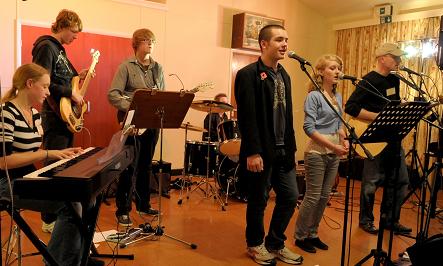- Home
- Products
- Sound Tech and PA
- Sound Tech DVDs & Downloads
- Free Tech Resources
- Free Sound Tech Lessons
- Playing By Ear
- Play By Ear DVDs & Downloads
- Ear Training & Music Theory Resources
- Worship Leading
- Worship Leading Course Downloads
- Free Worship Leader Training
- Free Worship Leader Resources
- Worship Band Skills
- Band Skills DVDs & Downloads
- DIY Worship Team Workshops
- Free Worship Team Training
- Free Worship Team Resources
5 practical ideas for working with your youth band
How to work with a youth praise band
Even if you aren’t a musician yourself there are numerous ways to help your youth band play better together. Here are five practical tips to try.
1. Keep it simple
Any band can vastly improve purely by playing the simple things well and avoiding songs or styles that are too complex to pull off convincingly. This means honing skills as basic as finishing the song at the same tempo it started, regular tuning and being more aware of the other instruments than just their own part.
2. Understand your role in the groove
Many bands sound bad because they work like five individuals playing their own version rather than a unit working together. If that’s your team then they need to understand groove. Groove is about each instrument finding its place in the underlying rhythm of the song and sticking to it. So this means guitar strumming patterns fitting with the accents in the rhythm of the melody and staying completely consistent, drums holding the same groove for the duration of the song and not free-styling when consistency seems boring, bass locking to that kick drum pattern and thinking like a rhythm instrument and not a frustrated lead guitarist, orchestral instruments not playing the melody; that’s what the lead vocal is for. Same goes for classical pianists. If they play too many parts just get them to use their right hand only. If the whole sound is too busy maybe get some to sit out for song but don’t skimp on practice and jamming. Express songs loudly, quietly, even take turns following each other through spontaneous dynamic changes.
3. Listen
Listening, watching and intuiting are overlooked skills too. In this kind of setting most of a musician’s concentration should be in listening to integrate their parts with the other instruments, watching the worship leader for dynamic changes, readjusting and changing the song/style/volume to help lead the congregation and of course grabbing moments to focus on the Lord yourself. With all that to think about you’ll probably only have a small amount of headspace for your own part, so play well below your ability threshold and focus on becoming a team player.
4. Stage positioning
Think about stage positioning too. Why do most worship teams set up like a rock band where the drummer can only see the back of the worship leader’s head? Experiment with positions where everyone can see each others faces to aid communication. Semi circles work well as does placing the drums side on, facing centre.
5. Be sensitive
Most of all try to get your team to play sounds that reflect the meaning in the lyrics, not just their favourite style. Take Blessed Be Your Name for example. It’s very easy to just to play with a big anthemic rock groove every time, but does that sound reflect best the meaning in the words? Maybe read the lyrics aloud, how does that make your players want to respond? Do they want to shout, laugh, cry, intercede or be silent? Can they reflect that in the way they play? They don’t have to be musical geniuses to do that either.


 Free Band Skills course with all Musicademy or Worship Backing Band DVD orders
Free Band Skills course with all Musicademy or Worship Backing Band DVD orders  Free gift with all Musicademy and Worship Backing Band DVD orders
Free gift with all Musicademy and Worship Backing Band DVD orders  Worship Training Day Ealing London 5 November 2022
Worship Training Day Ealing London 5 November 2022  How to get maximum exposure for your song writing
How to get maximum exposure for your song writing  Streaming online church services: the tech, the tips and the stories from around the world
Streaming online church services: the tech, the tips and the stories from around the world  What do you most struggle with as a worship musician?
What do you most struggle with as a worship musician?  Worship Leader Training: Beginning and Ending Songs Well
Worship Leader Training: Beginning and Ending Songs Well  Learn how to play by ear
Learn how to play by ear  4 tips for making good use of your mic
4 tips for making good use of your mic 

